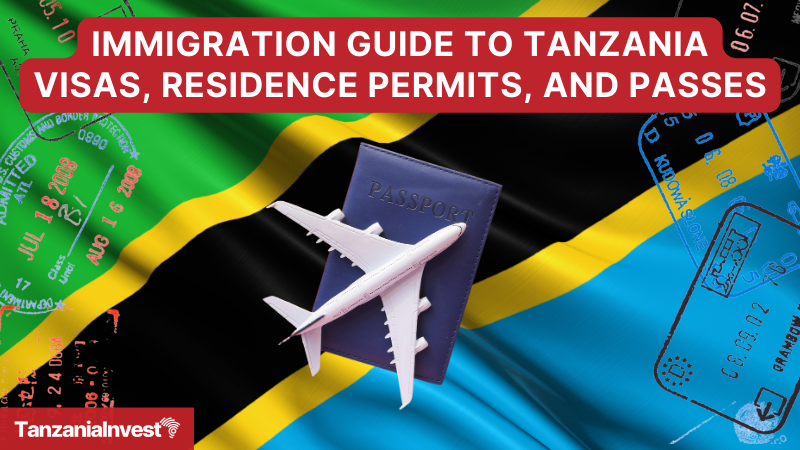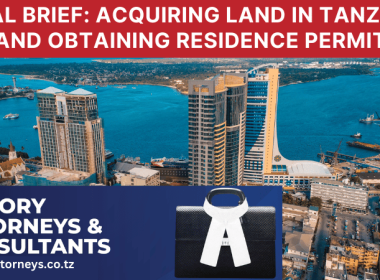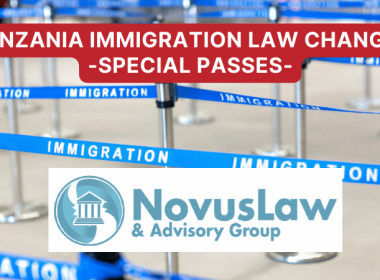Immigration
(Tanzania Visa Types, Residence Permits, and Special Passes)
Immigration is a crucial issue for any foreign investor interested in visiting, meeting, prospecting, or executing investments in Tanzania.
Understanding the various visa options and residence permit requirements is essential for successfully navigating the country’s investment landscape.
This article provides a comprehensive overview of visa types and residence permits, and recent developments in immigration laws for investors in Tanzania.
Visa Types for Visitors and Investors
Tanzania offers several types of visas to cater to different purposes of entry:
1. Ordinary Visa (Single Entry)
The Ordinary Visa is issued for single entry and is valid for up to three months. It is suitable for various purposes, including holidays, visiting, leisure, health treatment, studies, or other legally recognized activities.
2. Multiple Entry Visa
Designed for frequent visitors, the Multiple Entry Visa allows multiple entries into Tanzania over an extended period. This visa is particularly useful for investors who need to travel in and out of the country frequently.
3. Gratis Visa
The Gratis Visa is a special category of visa that may be issued free of charge under specific circumstances, such as for diplomats or individuals on official government business.
4. Transit Visa
The Transit Visa is for travelers passing through Tanzania to other destinations. It is valid for a maximum of seven days and is not extendable.
5. Business Visa
The Business Visa is specifically for those entering Tanzania for business purposes, including attending meetings, conferences, and exploring investment opportunities. It is typically valid for up to 90 days.
6. Student Visa
The Student Visa is issued to foreign students enrolled in Tanzanian educational institutions. It is valid for the duration of the study program.
Residence Permit Types
For longer stays and investment purposes, investors typically need to obtain residence permits:
1. Class A Permit
Issued to foreign investors who are self-employed or have invested in a business in Tanzania. This permit is suitable for those who have established a company or are planning to start a business.
2. Class B Permit
Class B Permits are for foreign nationals employed by companies registered in Tanzania. This permit is essential for expatriates working in managerial or technical positions within a Tanzanian company.
3. Class C Permit
This permit is typically issued to missionaries, researchers, and volunteers. However, recent amendments have expanded its scope to include real estate buyers.
It’s crucial to note that all applicants for Residence Permits should first obtain a Work Permit from the Ministry of Labour, except for those coming for purposes such as research, attending court cases, or retired persons.
4. Class C-11 Permit
Introduced by the Immigration (Amendment) Regulations, 2023, this permit allows foreigners to acquire residence by purchasing a house worth at least USD 100,000 in Tanzania. The introduction of the Class C-11 Residence Permit has created new opportunities for foreign real estate buyers but also raised questions about conflicts with existing land laws. For detailed information on acquiring land in Tanzania, you can visit our Guide to Buying Land and Real Estate in Mainland Tanzania for Foreign Investors and Obtaining a C-11 Residence Permit.
Passes
In addition to regular visas and permits, Tanzania offers passes for specific situations:
In addition to regular visas and permits, Tanzania offers various passes for specific situations:
1. Migrant Pass
Issued to foreigners intending to reside in Tanzania permanently.
2. Student Pass
For foreign students enrolled in Tanzanian educational institutions.
3. Dependent Pass
Issued to spouses and children of residence permit holders.
4. Visitor Pass
For foreigners visiting Tanzania for tourism or other short-term purposes.
5. Business Pass
Allows foreigners to conduct business activities in Tanzania.
6. Re-entry Pass
Permits residence permit holders to leave and re-enter Tanzania without losing their resident status.
7. Special Pass
A Special Pass may be issued to a foreigner living in or entering Tanzania to provide an opportunity to apply for and obtain a Residence Permit or Pass, or to complete any immigration formality. This pass is also used to allow a foreigner to regulate their immigration status after the expiry of their current status.
8. In-Transit Pass
For travelers passing through Tanzania to other destinations, valid for a maximum of seven days.
9. Landing Pass
Issued at entry points to foreigners who arrive without proper documentation but have valid reasons for entry.
Exemption Certificate
An Exemption Certificate is issued to certain categories of foreigners, such as diplomats and East African Community (EAC) students, exempting them from standard immigration requirements.
Procedures for Obtaining Visas, Permits, and Passes
For online Visa, Permits, and Passes applications visit: https://visa.immigration.go.tz/
Residence Permits for TIC and EPA Projects
Special provisions exist for investors involved in projects approved by the Tanzania Investment Centre (TIC) and Export Processing Zones Authority (EPZA). These investors may be eligible for streamlined permit processes and additional benefits.
Costs Associated with Visas and Permits
1. Visa Fees
– Business Visa: USD 250
– Tourist Visa: USD 50 to USD 100
2. Residence Permit Fees
– Class A Permit: Approximately USD 3,000 per year
– Class B Permit: Approximately USD 2,000 per year
– Class C Permit: Approximately USD 500 per year
Challenges and Recent Developments
Investors often face challenges such as delays in the issuance of permits, inconsistent application requirements, and bureaucratic hurdles. These issues can impede the investment process and create uncertainty for foreign investors.
In addition, recent amendments to the Investment Act have removed the automatic immigration quota of five work and residence permits for expatriate workers.
Meanwhile, the proposed Written Law (Miscellaneous Amendments) (No.2) Bill, 2024 aims to grant special status to Tanzanians in the diaspora, facilitating easier investment and residence processes.
Conclusion
Navigating Tanzania’s immigration landscape requires a thorough understanding of the various visa types, residence permits, and land acquisition procedures.
The introduction of new permit categories like the Class C-11 has created additional opportunities for foreign investors, particularly in real estate.
However, given the complexity of these regulations and potential conflicts between different laws, it is strongly recommended to seek advice from specialized legal practitioners. This ensures compliance with all relevant laws and helps investors make informed decisions when entering the Tanzanian market.
Last Updated: 22nd July 2024







